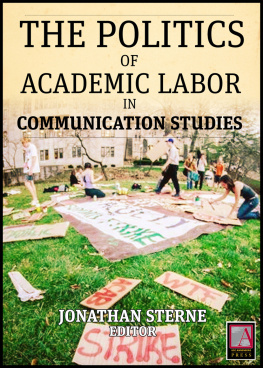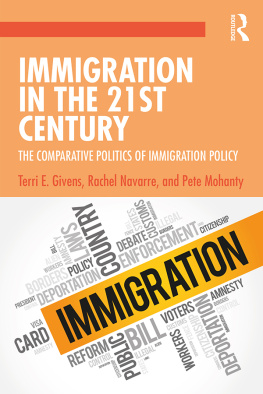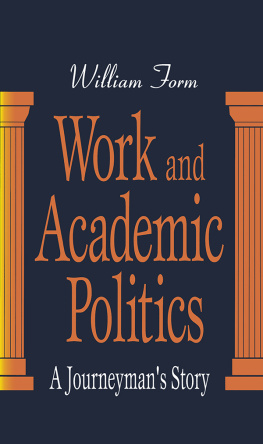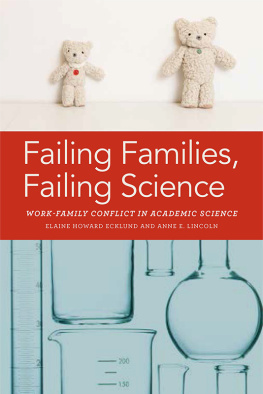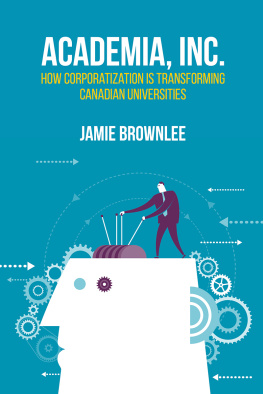Table of Contents

The articles from this collection previously appeared as a Special Section of the International Journal of Communication (http://ijoc.org), a publication of the USC Annenberg Press, University of Southern California. The Special Section can be accessed at http://ijoc.org/ojs/index.php/ijoc/article/view/1400/662
ISBN Ebook: 9781625171764
USC Annenberg Press is committed to excellence in communication scholarship, journalism, media research, and application. To advance this goal, we edit and publish prominent scholarly publications that are both innovative and influential, and that chart new courses in their respective fields of study. Annenberg Press includes e-books as a new cutting-edge forum featuring the work of both established and emerging scholars.
Larry Gross, Editor
Arlene Luck, Managing Editor

2013 USC Annenberg Press. Published under Creative Commons Non-Commercial No Derivatives (by-nc-nd) license.
JONATHAN STERNE
McGill University
Early in my term as department chair, I brought a dilemma to a faculty meeting. The dean had given us an envelope of money (a common and apt metaphor, at least at my university) to hire non-tenure-stream teachers. We had a choice. We could hire seven individual people on a single-course sessional contract basis to cover seven courses. Or we could hire one person, with a modest but real salary and benefitsnot to mention a nicer office and a CV lineto teach four courses as a faculty lecturer. There was no tender option. Either we hire at the more exploitative rate and staff enough courses for our undergraduates or squeeze our students to provide a better job to someone. We chose the sessional option.
If I learned one thing in my time as department chair, it was that constraint conditions the most basic experience of university administration, whether the administrator is in the lower-middle management positions usually occupied by faculty (program director, chair), or in the much higher administrative positions. Individuals in administrative positions are often presented with seemingly impossible choices that we must makeboth in the course of normal university business and in more acute situations where keeping the school running might be at stake. Today, it seems that the entire academic system is defined by these logics of constraintsetting the terms of decision making for individuals and whole systems alike.
Like all institutions, universities sometimes have to be coldly impersonal in order to run, and that impersonality can easily veer off into cruelty if people arent vigilant (and sometimes even if they are). But the manner and scene of coldness has changed over the past generation or so and acutely since the worlds largest bank scam went bad in 2008. In many places around the world, public higher education is being defunded and transformed. Students pay morewhere they can even afford to remain in schoolthere are fewer full-time professors, and the entire faculty and staff are being pushed harder to do more with less. Labor conditions are getting worse for everyone in most universities and colleges all around the world, and the stories keep coming. Right now, the clerical union at my university has just gone on strike (http://munaca.com). Although they are paid considerably less than full-time faculty, their complaints echo those often heard up and down university hierarchies: stagnating wages and benefits, workplace speed-ups and other erosions of job quality, less decision-making input, and lack of parity with other institutions.
The story so far more or less follows the familiar long-standing trope of a crisis of the university and the crisis of the human sciences. This is well-travelled territoryby some of the authors in this special section and also by writers in a wide range of academic fields (for an excellent review of the recent books in this area, see Deresiewicz, 2011). What is so surprising is how little attention has been directed at issues of academic labor in communication studies, and how infrequently people in our field have participated in national and international conversations about the labor politics of what we do. Analysis, critique, and programmatic thought on academic labor in communication studies has been a long time coming. While there have been sustained considerations of academic labor topics in fields like history, English, and anthropology, only now have some sectors of our field begun to develop a sense of urgency.
Perhaps this is because communication studies is not exactly a discipline. If you wanted to have a field-wide conversation, where would you go? ICA? NCA? SCMS? AEJMC? IAMCR? Thats not even a beginning if you want to think internationally, especially considering the overwhelmingly American bias of those organizations (except perhaps for IAMCR). We have a constellation of professional associations with overlapping intellectual jurisdictions and competing desires for preeminence. Our field is as intellectually diverse as it is institutionally diffuse, and it continues to grow and meld with allied disciplines. Departments and programs are still forming and expanding. The roots of thought on communication reach back into most of the human sciences and professional disciplines. The branches we perch on afford us particular views of the field that may or may not be commensurable with that of others. But if we are not united by heritage, orientation, perspective, or career aspiration, we can at least come together around a shared set of problems that affect almost every institution that uses a communication studies-related moniker.
There are other reasons why communication studies hasnt had the sustained conversation about academic labor that other fields have. One reason may simply be a combination of self-centeredness and good fortune. In relative termsat least as reported anecdotally by many of my colleaguesour so-called job market has been much better than fields like English, history, and anthropology. Communication studies has large applied branches and deep historical connections to a variety of professional schools. At least in terms of enrollment dollars, communication studies programs have also been cash cows for administrations. Our departments routinely have some of the highest student-to-faculty-ratios in our schools, and the staffing gap for courses is covered by fleets of perennial part-time and non-tenureable faculty (this is based on anecdotal evidenceI did not find a systematic study of this phenomenon, which is a little surprising given its pervasiveness). The field has at once been a testing ground for the casualization of the professoriate and an institutional holdover from a more serene moment, until recently avoiding some of the shrinking pains in other humanities and social sciences. To be fair, we are not quite as unique as we think: Looking at the use of non-tenure-stream faculty in professional fields like law, medicine and business, some similarities arise. But unlike those fields, many of our programs have been as likely to staff theory, academic, or non-applied courses with part-timers as they are to hire them for professional courses.
Although there are several radical traditions alive and well in communication studies, there are also many people in the field who have conservative and pro-business orientations; they would be unlikely to sign on to any serious rethinking of academic labor politics in the field, at least until their own comfort is threatened. As Thomas Discennas essay in this collection suggests, resistance to ideas of labor in communication studies may also emerge from the fields own intellectual habits, and one might trace that back to an even longer ambivalence toward and distance from labor as a concept in our field. The idea of communication expanded in our culture and in our field (to encompass an ever-growing arena of symbolic activity) just as the domain of things named by labor become more and more restricted. When their histories are read together, the two concepts have a shared, but inverted, intellectual trajectory (Schiller, 1996, p. x).
Next page
